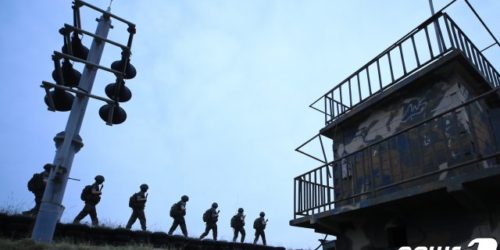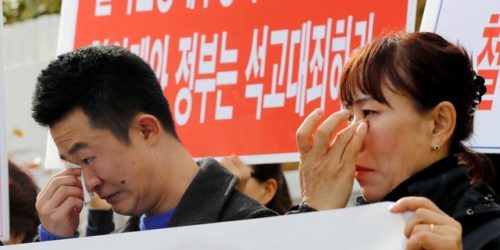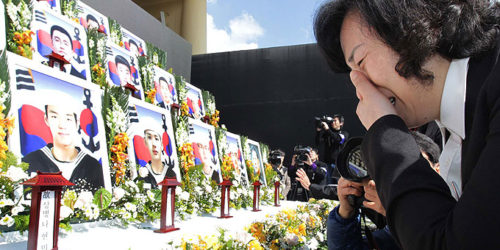Breakdown in Morale and Discipline in South Korea’s Military, Bases Infiltrated
2020-4-23, Tara O
Attacking Superior Officers
Four Non Commissioned Officers (NCOs) entered a Bachelor Officers Quarters (BOQ) and sexually assaulted their superior officer in South Korea. According to the Republic of Korea (ROK) Army’s information on April 14, 2020, four NCOs from the ROK Army’s direct unit with a strategic mission in the Chungcheong area, sexually assaulted their superior officer First Lieutenant “A,” a male. The four NCOs, after drinking, trespassed into the Lieutenant’s BOQ housing and grabbed his “specific body parts” in mid-March 2020 to humiliate him. It was reported that one NCO led, and the others supported the first NCO, in the assault. On April 22, 2020, the military police on the ground judged the incident to be crimes of assaulting a superior officer and a special trespassing of residence and charged the four NCOs.
In another incident, a ROK Army corporal (E-4, 22 years old) physically assaulted his company commander, Captain Han, with a shovel on April 1, 2020, 8:10 a.m. In a briefing by the ROK Army on April 20, 2020, an army unit in early April arrested a conscript on the charge of bodily injury to his superior officer. It is reported that the corporal complained that the maintenance of the shooting range is hard and did not complete his job. Captain Han was talking to the corporal face-to-face about it, and that is when the corporal attacked her with an entrenching shovel. She received an injury requiring 2 weeks of medical treatment.
In the U.S., the crime of “assaulting a superior officer” is punishable by confinement, forfeiture of pay, dishonorable discharge, among others, and in times of war, it is punishable by death, so it is a serious crime. The recent physical attack and sexual assault against junior officers in South Korea raise questions regarding the state of morale and discipline of the ROK military.
Republic of Korea Army Mascot
Crimes using Smartphones
There are other signs of declines in morale and discipline in the ROK military. In early April 2020, Army prosecutors found roughly 1,000 child pornography and exploitative files on the smartphone of a Private First Class (PFC) “B,” who helped promote and distribute them on Telegram, a cloud-based instant messaging and Voice over IP service, as part of the “Nth Room” scandal. In April 2019, soldiers were also caught illegally gambling hundreds of thousands of dollars using mobile phones, a relatively new phenomena after mobile phones were allowed among the conscripts in 2019.
The mobile phone use had been banned for security reasons in the past. This concern is especially warranted with the recent security breach. According to the information from the ROK Army on April 23, 2020, the soldiers in the front line units near the border with North Korea shared the classified daily security password phrases to enter a secured area on a Kakaotalk (a popular instant messaging app in South Korea) chat room using their smartphones on February 2, 2020. Such a laxed security procedure points to bigger problems.
Base intrusions
Protesters intruded the Jeju Naval Base on March 7, 2020
Yet another sign of the breakdown in military discipline and morale is the repeated intrusion into military facilities by civilians. This year alone, there have already been at least four cases of civilians intruding the military facilities–the Jeju Naval Base, Jinhae Naval Base, air defense positions under the Capital Defense Command (mission to defend Seoul), and the Defense Security Support School (intelligence school). For example, four anti-Jeju Naval base demonstrators cut the barbed wire fence and broke into the base in Gangjeong-dong, Seogwipo City, Jeju Province (also an island) on March 7, 2020, around 2:10 p.m. The South Korean Navy, however, did not know of the intrusion for at least an hour, and did not catch the perpetrators until two hours later. The motion activated alarm system did not work, the “Five-minute Readiness Team” took much longer to respond, and the reporting system was not working properly.
Absent Without Leave (AWOL)
It was discovered in September 2019 that a Korean Augmentation to the United States Army (KATUSA) soldier was missing from work for five months. What is worse is that the Korean authorities were not even aware until another soldier made an anonymous complaint. The KATUSA sergeant took advantage of the flux during a move from Yongsan Army Garrison to Garrison Humphreys and stayed home.
Minister of Justice Choo Mi-ae’s son also was absent without leave (AWOL) after he went on leave in 2017 and did not return in time. Choo’s son was assigned as a KATUSA in the U.S. 2nd Infantry Division when he went AWOL. His request to extend his leave by 10 days was granted, but when he again requested additional 10 days, the First Sergeant denied it. Choo Mi-ae, who was then the leader of Deobureo Minjoo Party (Democratic Party of Korea), called the higher headquarters to obtain the leave extension, overriding the First Sergeant. This weakens the chain of command and the authority of the First Sergeant, and given Choo’s position as a political figure, is an abuse of authority by Choo Mi-ae.
Degraded combat training
In an article “The Secret to Surviving Military Service: Moisturizer, Foam Cleanser, Cucumber Face Mask,” Jonathan Cheng describes how South Korean men learn and develop rather involved skin care routines during their military service, when they did not have a clue before entering the military. Meanwhile, as the conscript service duration is cut from 21 months to 18 months, the military cut combat skills training–the Army discarded 20 km ruck march training, the Air Force removed bayonet training, and the Navy reduced combat spirit training by half.
Leadership Problem
These problems highlight inadequate training, lax discipline, and degraded morale within the South Korean military. Perhaps it begins with not knowing what it is defending, which is a problem that began at the highest levels. During the presidential candidate debate in 2017, then-candidate Moon Jae-in, when asked if North Korea is a “main enemy” of South Korea, refused to answer, stating “that kind of ruling is not something a president should do.” (0:06) When his opponent said it is written in the Ministry of Defense White Paper as such, and asked why a potential Commander-in-Chief cannot clearly state it, Moon said “I made my position known.” (0:50)
In the 2018 Defense White Paper, which was the first Defense White Paper published after Moon became the president, the expression that “North Korea is our main enemy,” as well as “Kill Chain” and “KMPR” (Korea Massive Punishment and Retaliation) were deleted. Also deleted was “sharing the values of free democracy and market economy” between South Korea and Japan. The White Paper changed the order of military and technology cooperation with neighboring countries from “South Korea-Japan and South Korea-China” to “South Korea-China and South Korea-Japan,” downgrading Japan and prioritizing China.
North Korea, meanwhile, maintains offensive positions–it has forward deployed 70% of its 1 million+ military, maintains the largest special forces in the world, conducts cyber attacks, and is active in subversion activities against South Korea, all while maintaining its intention to unify Korea under its rule.
The South-North Military Agreement signed on September 19, 2018, severely weakens South Korea’s defense capabilities, so much so that in the words of a South Korean reserve general Shin Won-sik, it “can collapse the Republic of Korea itself.” (1:25) For an analysis on the agreement, see here.
Does high GDP (Gross Domestic Product) automatically lead to high military capability? No
In major media, South Korea’s military capability is assessed as high because its economy is the 12th largest in the world. They cite the high-tech weapons a wealthy economy can buy. What these pundits do not consider are the morale and discipline of the armed forces, and the leadership, in assessing the military capability.
Under these circumstances, perhaps it is not too surprising that soldiers attack their superior officers, conscripts commit serious crimes, bases get infiltrated by unauthorized civilians, and soldiers go AWOL.





